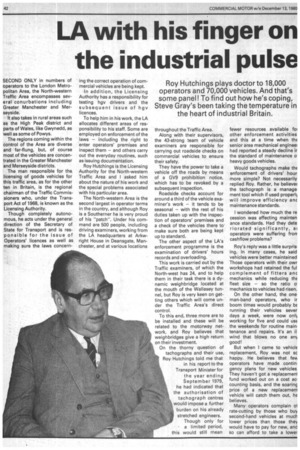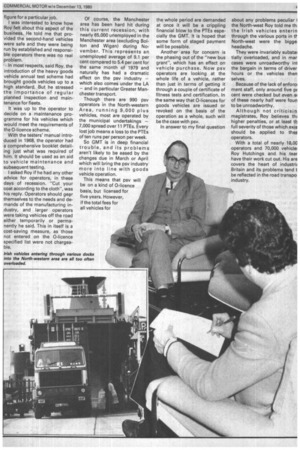LA with his finger on the industrial pulse
Page 44

Page 45

If you've noticed an error in this article please click here to report it so we can fix it.
Roy Hutchings plays doctor to 18,000 operators and 70,000 vehicles. And that's some panel! To find out how he's coping, Steve Gray's been taking the temperature in the heart of industrial Britain.
SECOND ONLY in numbers of operators to the London Metropolitan Area, the North-western Traffic Area encompasses several conurbations including Greater Manchester and Merseyside.
It also takes in rural areas such as the High Peak district and parts of Wales, like Gwynedd, as well as some of Powys.
The regions coming within the control of the Area are diverse and far-flung, but, of course most of the vehicles are concentrated in the Greater Manchester and Merseyside districts.
The man responsible for the, licensing of goods vehicles for this traffic area, as for the other ten in Britain, is the regional chairman of the Traffic Commis sioners who, under the Transport Act of 1968, is known as the Licensing Authority.
Though completely autonomous, he acts under the general direction of the Secretary of
State for Transport and is responsible for the issue of
Operators' licences as well as making sure the laws concern
ing the correct operation of commercial vehicles are being kept.
In addition, the Licensing Authority has a responsibility for testing hgv drivers and the subsequent issue of h g v licences.
To help him in his work, the LA allocates different areas of responsibility to his staff. Some are employed on enforcement of the .laws — including the right to enter operators' premises and inspect them — and others carry out the everyday routines, such as issuing documentation.
Roy Hutchings is the Licensing Authority for the North-western Traffic Area and I asked him about the nature of his work and the special problems associated with his particular area.
The North-western Area is the second largest in operator terms in the country, and although Roy is a Southerner he is very proud of his "patch". Under his command are 500 people, including driving examiners, working from the LA headquarters at Arkvvright House in Deansgate, Manchester, and at various locations throughout the Traffic Area.
Along with their supervisors, the 43-strong team of vehicle examiners are responsible for carrying out roadside checks on commercial vehicles to ensure their safety.
They have the power to take a vehicle off the roads by means of a GV9 prohibition notice, which has to be revoked by a subsequent inspection.
Roadside checks account for around a third of the vehicle examiner's work — it tends to be seasonal — with the rest of his duties taken up with the inspection of operators' premises and a check of the vehicles there to make sure both are being kept up to standard.
The other aspect of the LA's enforcement programme is the examination of drivers' hours records and overloading.
This work is carried out by the Traffic examiners, of which the North-west has 24, and to help them in their task there is a dynamic weighbridge located at the mouth of the Wallasey tunnel, but Roy is very keen on getting others which will come under the Traffic Area's direct control.
To this end, three more are to be installed and these will be related to the motorway network, and Roy believes that weighbridges give a high return on their investment.
On the thorny question of tachographs and their use, Roy•Hutchings told me that in his report to the Transport Minister for the year ending September 1979, he had indicated that the authorisation of tachograph centres would impose a further burden on his already stretched engineers. Though only for a limited period, this would still mean fewer resources available foi other enforcement activities and this at a time when thf senior area mechanical engineel had reported a steady decline ir the standard of maintenance o. heavy goods vehicles.
Would tachographs make th€ enforcement of drivers' hour more simple? Not necessarily replied Roy. Rather, he believe the tachograph is a manage. ment tool which if used properl) will improve efficiency anc maintenance standards.
I wondered how much the re cession was affecting mainten ance standards. Had they dete rio rated significantly, a: operators were suffering frorr cashflow problems?
Roy's reply was a little surpris. ing. In many cases, he said vehicles were better maintained Those operators with their owr workshops had retained the ful complement of fitters anc mechanics while reducing thE fleet size — so the ratio cr mechanics to vehicles had risen.
On the other hand, the one man-band operators, who ir boom times would probably bE running their vehicles sever days a week, were now only working for five and could USE the weekends for routine main. tenance and repairs. It's an il wind that blows no one any good!
But when I came to vehicIE replacement, Roy was not sc happy. He believes that fey operators have made contingency plans for new vehicles They haven't got a replacemeni fund worked out on a cost accounting basis, and the soaring price of a new replacemenl vehicle will catch them out, hE believes.
Many operators complain 01 rate-cutting by those who buy second-hand vehicles at much lower prices than those they would have to pay for new, and so can afford to take a lower
figure for a particular job.
I was interested to know how Roy felt about this aspect of the business. He told me that provided the second-hand vehicles were safe and they were being run by established and responsible operators there was no real problem.
In most respects, said Roy, the introduction of the heavy goods vehicle annual test scheme had brought goods vehicles up to a high standard. But he stressed the importance of regular planned inspection and maintenance for fleets.
It was up to the operator to decide on a maintenance programme for his vehicles which would meet the requirements of the 0-licence scheme.
With the testers' manual introduced in 1968, the operator had a comprehensive booklet detailing just what was required of him. It should be used as an aid to vehicle maintenance and subsequent testing.
I asked Roy if he had any other advice for operators, in these days of recession. "Cut your coat according to the cloth", was his reply. Operators should gev themselves to the needs and demands of the manufacturing industry, and larger operators were taking vehicles off the road either temporarily or permanently he said. This in itself is a cost-saving measure, as those not entered on the 0-licence specified list were not chargeable.
Of course, the Manchester area has been hard hit during this current recession, with nearly 65,000 unemployed in the Manchester area (excluding Bolton and Wigan) during November. This represents an unemployed average of 9.1 per cent compared to 5.4 per cent for the same month of 1979 and naturally has had a dramatic effect on the psv industry — which also comes under the LA — and in particular Greater Manchester transport.
Though there are 990 psv operators in the North-western Area, running 9,0 0 0 plus vehicles, most are operated by the municipal undertakings — 7,000 spread over 11 PTEs. Every lost job means a loss to the PTEs of ten runs per person per week.
So GMT is in deep financial trouble, and its problems aren't likely to be eased by the changes due in March or April which will bring the psv industry more into line with goods vehicle operation.
This means that psv will be on a kind of 0-licence basis, but licensed for five years. However, if the total fees for all vehicles for the whole period are demanded at once it will be a crippling financial blow to the PTEs especially the GMT. It is hoped that some form of staged payment will be possible.
Another area for concern is the phasing out of the "new bus grant", which has an effect on vehicle purchase. Now psv operators are looking at the whole life of a vehicle, rather than just in terms of getting it through a couple of certificate of fitness tests and certification. In the same way that 0-licences for goods vehicles are issued or revoked on the basis of the operation as a whole, such will be the case with psv.
In answer to my final question about any problems peculiar l the North-west Roy told me th! the Irish vehicles enterin through the various ports in tb North-west were the bigge: headache.
They were invariably substai tially overloaded, and in mar cases were unroadworthy int the bargain in terms of driver hours or the vehicles then selves.
Because of the lack of enforci ment staff, only around five p€ cent were checked but even si of these nearly half were foun to be unroadworthy.
Although not criticismn magistrates, Roy believes tl-li higher penalties, or at least th full severity of those which exis should be applied to thes operators.
With a total of nearly 18,00 operators and 70,000 vehicle! Roy Hutchings and his tear have their work cut out. His are covers the heart of industrii Britain and its problems tend t be reflected in the road transpo industry.
















































































































